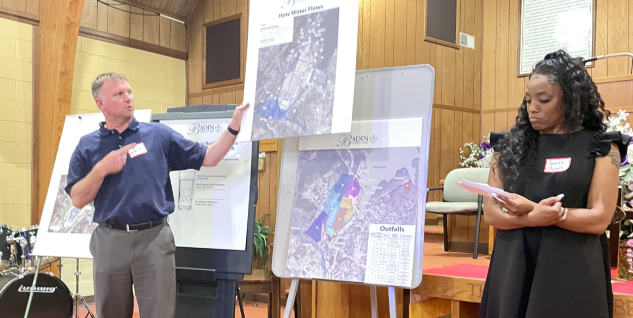West Badin citizens, ALCOA discuss environmental topics regarding Badin Business Park
Published 2:12 pm Thursday, June 22, 2023

- Jason Mibroda shows the stormwater flow pattern across the Badin Business Park at Tuesday's community meeting moderated by Avonda Thomas. (Photo by Charles Curcio/staff)
|
Getting your Trinity Audio player ready...
|
The quality of the water in Badin Lake, Little Mountain Creek and the operations of the Badin Business Park were topics of a recent community meeting.
Members of the West Badin community hosted a forum Tuesday at First Baptist Church to discuss topics related to the former ALCOA plant location.
Avonda Thomas served as moderator for the event, asking questions given to her from audience members on index cards.
Robyn Gross, director of ALCOA Transformation, along with Jason Mibroda, remediation manager, answered questions from the public.
Gross said ALCOA Transformation is “an organization that manages all our closed and curtailed facilities to take them through demolition, decommissioning and redevelopment. Our objective is to be good environmental stewards of the property while at the same time bringing them back to productive use.”
She noted the plant has been in Badin since 1917, predating the Environmental Protection Agency (EPA). Even before active operations of aluminum production stopped in 2007, Gross said, the company started doing environmental studies of the site.
Mibroda said the plant’s environmental work has a waste program and a water program, both managed by the state’s Department of Environmental Quality (DEQ).
He said the water program “deals mainly with surface water leaving the site.”
Candice Lowder, director of the county’s Economic Development Commission, said the EDC’s job was to “assist with the redevelopment of the Badin Business Park” by “proactively looking for companies that are interested in the robust infrastructure available at the site.”
Once a company like Custom Alloy Corporation, Electronic Recyclers International or Cube Hydro shows interest in the Badin Business Park, Lowder said, the EDC puts the company in contact with representatives of the park.
In the question-and-answer session, Mibroda said the only part of the park where fluoride levels are above the state standard is Outfall No. 5 on the southern end of the park.
He noted the EPA standard for drinking water is four parts per million (PPM) and the state’s standard for the environment is 1.8 ppm. The No. 5 outfall had a yearly average since 2019 of 1.88 ppm, which Mibroda said “is nowhere near that EPA limit.”
However, the water in question is storm water and not water coming from any industrial activity on the premises, according to ALCOA officials.
Officials with ALCOA Transformation were asked how “you can develop an area which is documented to have hazardous materials in unlined parts or areas around the town?”
“There is no buried waste in the town. Every buried waste sits on ALCOA private property,” Gross said.
She added the company is working with the state “to determine if our placement and covering of the waste is protected. We believe it is. We believe the data shows it was.”
Mibroda added “any of the remedies that will be employed will require ongoing monitoring to ensure that the environment remains protected.”
Gross said both Little Mountain Creek and Badin Lake were safe to recreate in and drink, adding what the company is dealing with is environmental concern and “not human health concerns.”
When asked about how ALCOA chooses a tenant for Badin Business Park, Lowder said the EDC has “a lot of desktop review that occurs before a company gets to ALCOA.” She said the EDC does research on prospective companies, including if they are “financially solvent” and “good stewards of their employees, environment and community.”
Gross said the single biggest misconception she has heard about the former plant is the safety of people in the lake and Little Mountain Creek.
“There is no human health risk,” Gross said. “It’s bugs and bunnies, and we’re doing everything we can to find a solution to protect them, but it’s not a human health issue.”
According to information obtained this week by The Stanly News & Press from ALCOA, PCBs (polychlorinated biphenyl), PAHs (poly chlorinated biphenyl) and “many other contaminants have been tested for multiple times over the course of several years. These studies, which test for 126 chemical pollutants that the EPA regulates under strict analytical methods, were performed most recently in 2018, 2019 and 2022 in support of the water quality permit. The NC Department of Environmental Quality uses this data to establish required ongoing monitoring for constituents that have a reasonable potential to be present.”




